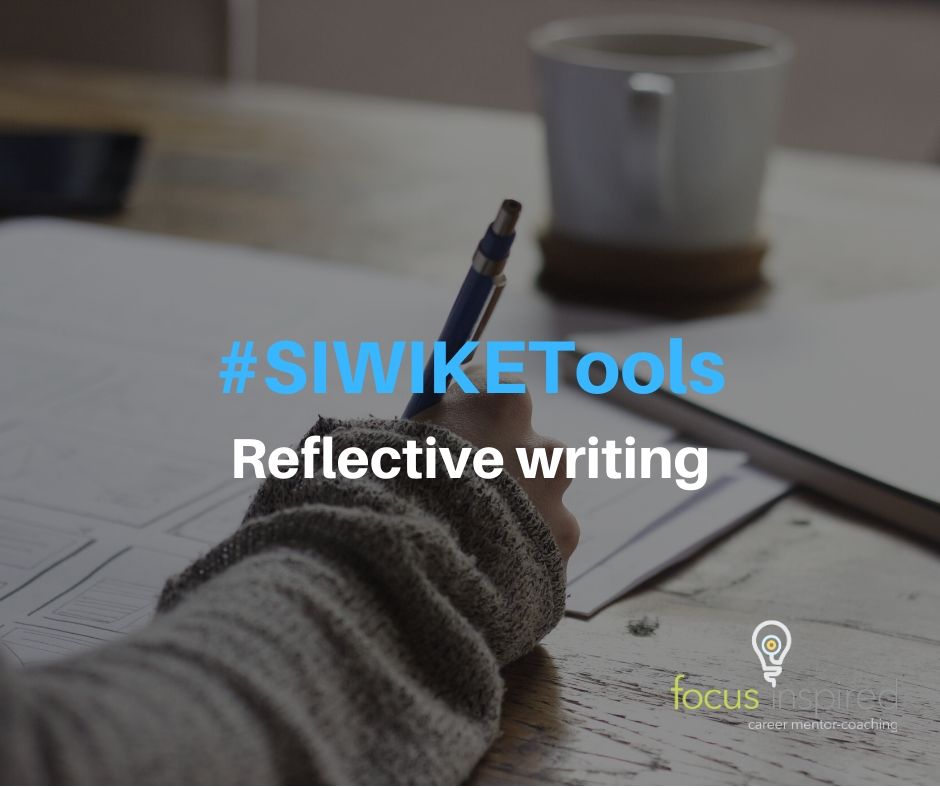
SIWIKE Tools: Reflective writing – journaling
“an unexamined life is not worth living” -Socrates
Whether you agree With Socrates or not, the practice of reflective writing can be eye-opening. If you don’t like the term reflective writing then call it by its normal name: journaling. Taking some time out of your day or your week to examining yourself can be helpful in providing you with more self-awareness as well as areas of improvement.
Here are a few reflective writing practices that I currently use or have in the past:
5 minutes:2-2-1
While I’m not sure if that’s a good name for it it’s what I came up with. Basically spending five minutes in your day reflecting on moments of flow and energy drain.
Take two minutes to write down what drained you. Those moments that if you never had to do it again you’d be a happy person. As you’re writing down look to be specific. Time of day. People you were with. Events that happened before, after. Possibly even what you ate.
Then take two more minutes to write down what energized you. If you ever experienced a state of “flow”. Where are you lost track of time and you were doing things effortlessly. You had extreme enjoyment and what you were doing. And time seems to fly by. You might not have these moments daily, and when you do, be sure to note them down. Again be specific.
Next spend one more minute planning on how you can minimize the first, and maximize the second. You may not be able to completely eliminate the things that drain you, though you should be able to minimize them. And you may not be able to only spend time on the things that energize you, again you should be able to maximize it.
One last step is to add a weekly and a monthly review. Take a look at all of the times that drained you, all of the times that energized you and look for patterns. See if you can find any commonalities between the two. As you do so you’ll be pointed to what your strengths are and what you enjoy doing. Versus your areas of development that you can consider doing or not.
Useful for: finding what you are passionate about!
MIT
No not the technology school. In this case, MIT stands for the most important thing. This writing exercises more about prioritization and planning.
Write down the one, two or three most important things that if you didn’t get anything else done today, you would make sure you get those three things done. Then you have to make sure you have the appropriate time allocated in your day to get them done. A good idea is to start them as soon as you can so that you are not distracted by other activities.
Starting your day with clear priorities can help you be much more effective, not just efficient with your time.
Useful for: productivity
Gratitude and compassion
Many people seek to be happy. Unfortunately, many spend time focussing on what they want versus what they have. Daily gratitude practises incorporated into your reflective writing can be very powerful in grounding you to all of the wonderful abundances you already have. Doing so also has scientifically back to research saying that it would help your health, primarily by lowering your stress levels.
- I like to use a ROSE gratitude acronym. Relationship: what is one relationship, one person whom you are thankful for? Think of family, friends, coworkers, colleagues, other people you recently or not so recently met.
- Opportunity: What is one opportunity or something that you plan to do or able to do that you are thankful for? This could be on the business side, or personal, or some little luxury that you are able to do or plan to do
- Simple: what is something simple that you are thankful for? Some things as simple as access to running water, clothing, food, a roof over your head, clothes, The sun, the air, really anything. The simpler the better.
- Experience: what is one experience that you’ve had that you are thankful for having? What about a happy event that you’ve had in the past, a proud moment that you experience, or any sort of experience you’ve done in the past.
Do your best not to repeat. At least not over the course of the week. If you can come up with some new as in never previously written things to be grateful for, and you can really show yourself the abundance you truly have.
Inspired by Tim Ferriss (ROSE)
Useful for: mental wellness
Ideas
Another good reflective writing practice is to jot down ideas and express your creativity. Spend some time coming up with ideas. For anything and everything. Might be from a business perspective. Might be some minor improvement in something else. It might be on things to do over the weekend. Create a list of 5 to 10 items on any particular topic. Practice brainstorming and coming up with more and more creative ideas. The goal is not to be realistic about any of these ideas. The goal is to be creative.
Note that you will probably go through a bunch of nonsensical ideas. And once in a while, you’ll have a diamond in the rough or gold.
Inspired by James Altucher.
Useful for: creativity
Do you have other reflective writing practices that I should include here? Please email me at luki@focusinspired.com to let me know!
Follow:Share: